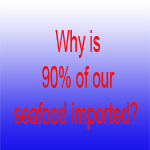| Ms. Benjamin nailed it in this column - and anyone
who has traveled up or down the East coast with an eye half-way open and
an intellect half-way alive would have to agree.
[ for
a FishNet that discusses coastal development and the "New Conservationists"
who are as blind to Pogo's pronouncement (see below) as they are to the
impacts of their life-style on the very marine resources they are so intent
on pretending to conserve.] for
a FishNet that discusses coastal development and the "New Conservationists"
who are as blind to Pogo's pronouncement (see below) as they are to the
impacts of their life-style on the very marine resources they are so intent
on pretending to conserve.]
[ for
a view of coastal development in North Carolina] for
a view of coastal development in North Carolina] |
I was recently perched in a window seat of a big jumbo jet flying along
America's eastern coastline.
It was depressing. Very depressing.
From the Maryland portion of Chesapeake Bay all the way to the Everglades,
I and the rest got an unnerving view of what's happened to the waterfront.
It was a quick lesson in land use, a lesson I almost wish I hadn't seen.
I saw factories spewing all kinds of stuff from smokestacks. They were
located, again and again, right on a river or estuary just a bluefish cast
from the ocean.
I saw lots of parking lots located right on the waterfront. Not that
you have to go particularly far to see that kind of ecological nonsense,
for from my battered Cape Cod Times chair in the Provincetown bureau sits
a splendid view of the MacMillan Wharf parking lot, the town's biggest
and baddest. It features rows of cars parked less than 20 feet from Provincetown
Harbor. When it rains, you can watch oil, antifreeze, cigarette butts (does
anyone understand why people, especially tourists, dump ashtrays in parking
lots?) pouring into the harbor.
Cars and factories, roads and houses. The whole east coast is a cesspool
of overbuilding and stupid building. We've allowed an environmental wrecking
ball of colossal proportions to wiggle its way for thousands and thousands
of miles along the coast.
You just know it will never be undone, which makes the heart simply
shudder. As much as Massachusetts loves to impose rules and regulations
on its citizenry, nobody foresees the town of Provincetown being forced
to relocate that parking lot - not now, not ever. Same for all the other
pollution factories that lace nearly every estuary and tidal river along
the eastern seaboard.
What do these sky-high observations have to do with a commercial fishing
column?
Because late at night, when the souls of all the fish you've killed
come back to haunt you, and you're wondering about the state of the fisheries
and questioning why The Guys in Charge only have one target in their sights
- fishing pressure - and you wonder what is really causing stocks of every
stupid fish that lives on this earth to plummet ... You just about have
to know it's the whole ecosystem gone crazy.
As Pogo said long ago: We've met the enemy, and it's us.
We have overpopulated our nest, and it shows. Funny thing, nobody seems
to talk up Zero Population Growth any more.
During the Valdez oil spill, Woods Hole's John Pearce said something
I'll never forget: The amount of oil that drips into the ocean minute by
minute, day by day, is a zillion times greater than could ever be caused
by one splashy, media-sparkly oil spill. That's the much bigger worry,
and we seem to do nothing about it.
We know Cape Cod has certain estuaries and small bays that have turned
eutrophic or nearly so, from too much nitrate-loading (read: septic systems
and lawn fertilizers) flowing into these badly flushed systems. Long Island
Sound, which is bigger than a breadbox, is nutrient-loaded, for gosh sake.
On the West Coast, urban residents are getting a first taste of regulation.
The feds have listed many of the numerous salmon stocks out there (each
one supremely linked to its particular river system). Consequently, the
residents of Washington state and Oregon are, for the first time ever,
going to pay cash money and be forced to tweak their lifestyles to meet
structures of the Endangered Species Act.
Fishermen there, of course, have been restricted for ages. But everyone
has known that habitat problems were the curse for these wondrous silvery
flashes that swim upstream like our bass. Particularly around Portland
and Seattle, residents will change how they water lawns, wash cars and
be restricted in their pesticide and fertilizer use. New waterfront-watershed
developments are now curbed.
Seattle has runaway urban sprawl in a big way, just like Florida and,
yes, Cape Cod. Their mayor says, "In working to protect the salmon, it
may turn out that the salmon saves us." Smart fella.
Our flounder and other nearshore fish haven't yet triggered the ESA,
but after that airplane ride, you almost wish they would.
We seem to be a species with no brains, no brains at all. |



